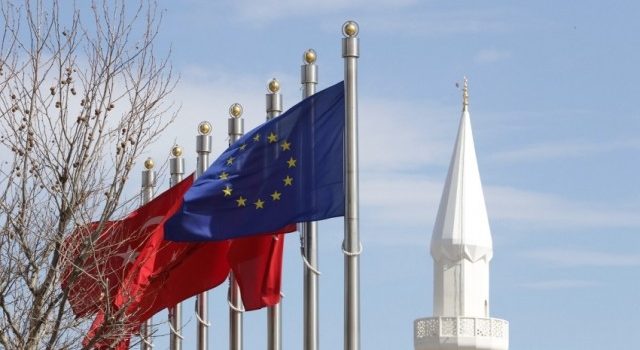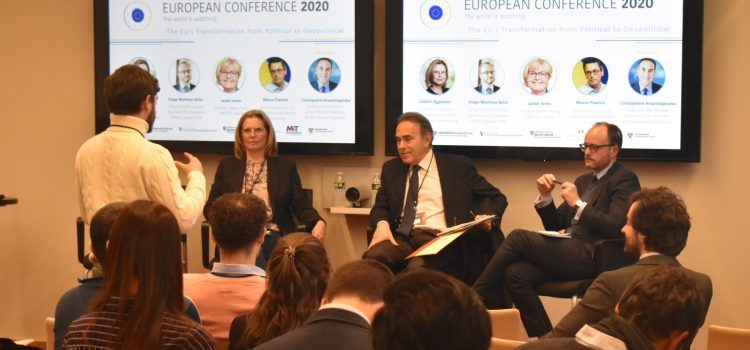Όταν αναλύεις τη διεθνή πολιτική με λάθος εργαλεία και δεν μελετάς τον αντίπαλό σου, η σύγκρουση με την πραγματικότητα είναι αναπόφευκτη. Χαρακτηριστικό παράδειγμα αποτελούν οι τελευταίες εξελίξεις. Ενώ η Τουρκία προετοίμαζε την οπλοποίηση του προσφυγικού-μεταναστευτικού, οι εγχώριοι γνωμηγήτορες προσπαθούσαν να φτιάξουν κλίμα για προσφυγή στη Χάγη.
Η Ερντογανική, αυταρχική και Ισλαμική Τουρκία μας κάνει, εδώ και καιρό, μπούλινγκ για να μας εξαναγκάσει σε συνεκμετάλλευση στο Αιγαίο και στην Ανατολική Μεσόγειο παραβιάζοντας κάθε κανόνα δικαίου και τα κυριαρχικά μας δικαιώματα. Ενδεικτική των προθέσεών της είναι και η παράνομη συμφωνία που υπέγραψε με τη Λιβύη.
Τώρα οπλοποίησε πρόσφυγες και μετανάστες. Οπλοποιεί και κατευθύνει μια πλημμυρίδα απελπισμένων ανθρώπων που μπορούν να καταλύσουν οποιοδήποτε κράτος. Είναι μια σοβαρή κλιμάκωση της επιθετικότητάς της. Είναι μια γκρίζα υβριδική εκδοχή ενός θερμού επεισοδίου.
Η Τουρκία οπλοποιεί το προσφυγικό-μεταναστευτικό εκβιάζοντας Ευρώπη και Ελλάδα. Εκβιάζει την Ευρώπη για ανταλλάγματα και επιδιώκει να παραλύσει, να φινλανδοποιήσει την Ελλάδα.
Ο Ερντογάν συμπεριφέρεται με όρους ισχύος, γνωρίζοντας ότι η σημερινή διεθνοπολιτική συγκυρία του αφήνει περιθώρια τέτοιων συμπεριφορών χωρίς σοβαρές κυρώσεις.
Η Τουρκία αποτελεί διαχρονική και σοβαρή απειλή για τη χώρα μας. Από το 1974 και μετά, η Κεμαλική Τουρκία έβαλε στο τραπέζι μια σειρά από αιτιάσεις, όπως το εύρος του εθνικού εναέριου χώρου και της αιγιαλίτιδας ζώνης, το FIR, τις γκρίζες ζώνες, την αποστρατιωτικοποίηση των νησιών κ.λπ. Τις αιτιάσεις αυτές τις προωθεί μέσα από συνεχείς παραβιάσεις και παραβάσεις και πολιτικοστρατιωτικές κρίσεις τύπου Ιμίων. Ο στόχος είναι προφανής. Με μια συνεχή πίεση αυξομειούμενης έντασης να προσπορίσει πολιτικά οφέλη σταματώντας ένα βήμα πριν τη γενική σύρραξη. Ενίοτε το επιτυγχάνει, όπως μετά τα Ίμια ανάγκασε την κυβέρνηση Σημίτη στη Μαδρίτη να αναγνωρίσει ζωτικά συμφέροντα της Τουρκίας στο Αιγαίο.
Υπό τον Ερντογάν η Τουρκία, σταδιακά, απομακρύνθηκε από τη Δύση. Η ευρωπαϊκή της προοπτική κατέρρευσε, μαζί και η λογική του Ελσίνκι. Όχι γιατί εγκατέλειψε το Ελσίνκι η κυβέρνηση Καραμανλή, όπως πονηρά ισχυρίζεται ο κ. Σημίτης. Αλλά γιατί το εγκατέλειψε η πραγματικότητα. Γιατί, τελικά η Τουρκία, αλλά και η Ευρώπη, εξυπηρετήθηκαν αμφότερες από μια αμιγώς εργαλειακή και ανταλλακτική σχέση. Αντί για δημοκρατικό μετασχηματισμό και σύγκλιση με το ευρωπαϊκό κεκτημένο, η Τουρκία αποχαλινώθηκε. Ο Ερντογάν διολίσθησε σε αυταρχισμό στο εσωτερικό και επιθετικότητα στα εξωτερικά.
Αυτοί, λοιπόν, που μας σπρώχνουν στη Χάγη κρύβοντας από πίσω ένα νέο Μόναχο, πρέπει να καταλάβουν ότι δεν μπορείς να δαμάσεις έναν διεθνή ταραξία, που υπακούει μόνο σε όρους ισχύος, βασιζόμενος στην καχεκτική διεθνή δικαιοταξία. Η επιθετικότητα της Τουρκίας δεν αντιμετωπίζεται με κατευνασμό αλλά με ανάσχεση και αποτροπή.
Η Ελλάδα δεν είναι αδύναμη και η Τουρκία δεν είναι παντοδύναμη. Αντί να σπεύδουμε να κατευνάσουμε την Τουρκία πρέπει να αυξήσουμε τους πολλαπλασιαστές ισχύος μας (διμερείς συμμαχίες κ.ά.) και να θωρακίσουμε την άμυνα και την αποτροπή μας. Μια ισχυρή Ελλάδα μπορεί να αναγκάσει την Τουρκία να εγκαταλείψει τις μαξιμαλιστικές αιτιάσεις της. Αλλιώς, η Τουρκία θα συνεχίσει να προκαλεί καταρρακώνοντας κάθε κανόνα διεθνούς και ευρωπαϊκού δικαίου, που εμείς επικαλούμαστε. Θα συνεχίσει να γκριζάρει ζώνες εθνικής κυριαρχίας και στο τέλος θα έχει κερδίσει με τη φοβέρα, χωρίς να χρειαστεί να ρίξει ούτε μια σφαίρα.
Πρώτη δημοσίευση: εφημερίδα “ΤΑ ΝΕΑ”, στήλη “ΑΝΤΙΛΟΓΟΣ”


